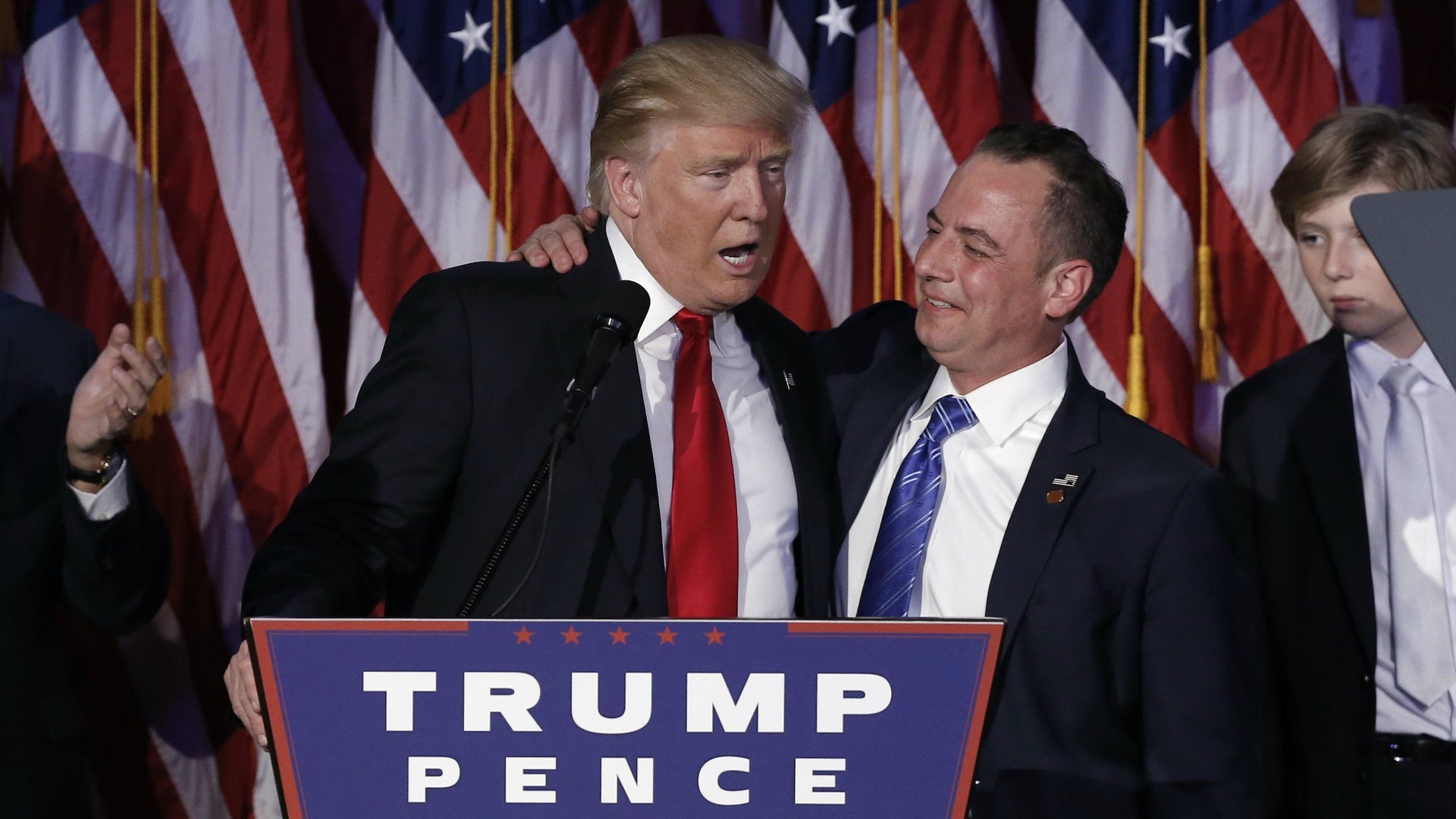Trumpism is about to collide with Republican orthodoxy in a most peculiar way
Donald Trump’s populism is losing some of its sheen on the journey from the gilded penthouse of Trump Tower to the nation’s capital.


Donald Trump’s populism is losing some of its sheen on the journey from the gilded penthouse of Trump Tower to the nation’s capital.
The establishment is striking back in many ways, not the least in the form of House speaker Paul Ryan and Senate majority leader Mitch McConnell. And it is turning Trump into the sort of Republican that reinvigorated, newly populist Democrats might actually be able to fight effectively: the false prophet whose words on behalf of ordinary Americans prove to be nothing but empty rhetoric.
Josh Barro, the normally insightful commentator at Business Insider, got it exactly backwards when he warned of the dangers of Democrats offering too much pushback to president Trump. He tweeted: “If Dems use a McConnell-style Massive Resistance approach to Trump, they’ll just drive him into McConnell and Ryan’s arms.”
Just?! Just?! That’s the whole point of the Democratic strategy that has taken shape in these very few days since the election. Senator Elizabeth Warren, the Massachusetts Democrat, said it clearly in her first speech after the election: “Donald Trump won the presidency under a Republican flag. But Mitch McConnell, Paul Ryan, and the Republicans in Congress—and their way of doing business—were rejected—rejected by their own primary voters, rejected during the campaign, and rejected in Tuesday’s election.”
Senator Sherrod Brown, an Ohio Democrat who is up for re-election in 2018 in a state Trump won, said after the election that he’d work with Trump if the new president wants to tank the North American Free Trade Agreement, which Brown doesn’t like. The Cleveland Plain Dealer called it an “olive branch” to Trump, but that’s an inaccurate interpretation. It’s actually a poisoned chalice, a means to divide Trump from congressional Republicans who support NAFTA.
The targets for Democrats to shoot at are piling up rapidly because Trumpism is on a collision course with Republican orthodoxy on Capitol Hill.
The New York real estate mogul assumed a populist veneer not only through his xenophobia but through his promises that sounded, well, Democratic. Protect Social Security and Medicare. Invest in the American infrastructure. Impose some version of the Great Depression-era law that split up banks.
This list of Trump’s transition team leadership also tells us quite a bit. Trump voters pushed the anti-Washington establishment #draintheswamp hashtag in the final weeks of the campaign, so some of the very establishment-sounding names on this list might come as a shock: most are registered lobbyists and the ones who are not are known advocates for one type of industry or another. There are signs of some belated housecleaning on the lobbyist front, but representatives from the world of high finance also appear to be taking several seats at the table.
For Treasury secretary, the new administration is looking at Steven Mnuchin, a second-generation Goldman Sachs banker who was a fundraiser for Trump. Adviser Wilbur Ross, a leveraged buyout maven, was literally president of a secret Wall Street club that involves dressing in drag and making fun of plebeians. There isn’t a bit of rhetoric from the Trump transition’s statement on financial regulation that doesn’t seem copied straight from what Republicans have said for the past six years.
“We are seeing the real Donald Trump,” said Felicia Wong, president of the Roosevelt Institute, a liberal think thank. “And it’s not what people voted for.”
Trump’s biggest #draintheswamp speech came at Gettysburg in late October, when he laid out his plan for his first 100 days in office. Item number one: an amendment to the Constitution imposing term limits on members of Congress. And yet, what was the first thing he mentioned the day after the election? “We’re going to rebuild our infrastructure, which will become, by the way, second to none. And we will put millions of our people to work as we rebuild it.”
It fell to Senate majority leader McConnell to pour cold water on elements of the Trump plan that don’t jibe with Republican orthodoxy. Forget term limits for members of Congress. The Kentucky Republican doesn’t sound too keen on infrastructure programs either. But repealing Obamacare—that’s up there.
“We look forward to working with him,” McConnell said. “I think most of the things that he’s likely to advocate we’re going to be enthusiastically for.” (You can almost hear McConnell laughing like a hyena when mentioning how most of the things that Trump supports will get a warm reception.) Then, on the other side of the Capitol, there’s Ryanism. House speaker Paul Ryan wants to repeal Obamacare and, we now learn post-election, privatize Medicare too.
Sure, Trump could try to bend congressional leaders to his will. But that requires a supple approach that doesn’t sound terribly Trump-like. He’d have to push recalcitrant congressional Republicans with the threat of primary challenges, and grasp how the twists and turns of legislative process limit your choices sooner than you realize. Trump harnessed elemental forces in America with his words; it will take more than a Twitter account to wrangle lawmakers.
The central challenge that Hillary Clinton faced in running against Trump stemmed from her damaged credibility as a populist—her reputation as a candidate who was tight with Wall Street but migrated leftwards to secure the nomination proved almost impossible to shake. Now Clinton is gone, Warren is a de facto party leader, and top Democrats have endorsed Keith Ellison, the very liberal Minnesota Democrat who predicted Trump’s rise among Republicans, to head the Democratic National Committee.
The constraints of power, the American system of government, and being a Republican won’t moderate Trump’s politics into something that Democrats find acceptable. But it is morphing them into something akin to Republican orthodoxy. And that, for the first time in a long time, will be something that a truly populist Democratic Party can credibly attack—with great gusto.